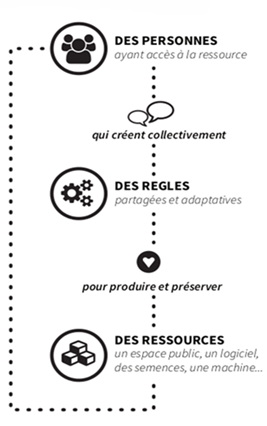« Philosophie des communs/en » : différence entre les versions
Page créée avec « The eight fundamentals of sustainable governance of common pool resources : » |
Page créée avec « # Clearly defined access limits (to exclude external or unwelcome entities) # Rules well adapted to the needs and conditions, and in line with the objectives of the individuals brought together # A system enabling individuals to participate regularly in defining and modifying rules # Governance that is effective and accountable to the community and to the owners # A graduated system of sanctions for resource appropriations that violate community rules # A low-cos... » |
||
| Ligne 15 : | Ligne 15 : | ||
The eight fundamentals of sustainable governance of common pool resources : | The eight fundamentals of sustainable governance of common pool resources : | ||
# Clearly defined access limits (to exclude external or unwelcome entities) | |||
# | # Rules well adapted to the needs and conditions, and in line with the objectives of the individuals brought together | ||
# | # A system enabling individuals to participate regularly in defining and modifying rules | ||
# | # Governance that is effective and accountable to the community and to the owners | ||
# | # A graduated system of sanctions for resource appropriations that violate community rules | ||
# | # A low-cost conflict resolution system | ||
# | # Self-determination recognized by external authorities | ||
# | # Where appropriate, a multi-level organization, always based on common resources. | ||
# | |||
Version du 31 juillet 2023 à 09:28
Definition of a digital common

A common refers to a resource produced and/or exploited collectively by a community of heterogenous players and governed by rules ensuring its collective and shared nature.
Digital commons bear new characteristics: the use of the resource by some does not limit the possibilities of use by others (the resource is non-rival) and it is not necessary to reserve the right of use to a restricted community in order to preserve the resource (the resource is non-exclusive).
As a result, digital commons benefit from being shared, as this directly increases the value of the resource but also extends the community that will preserve it.
Common operating principles Elinor Ostrom aims to "develop theories of human organization based on a realistic assessment of human capabilities and limitations in terms of managing a variety of situations that initially share some or all aspects of a tragedy of the commons".
In Governing the Commons, Ostrom reports on a meta-analysis based on numerous case studies of self-organized common-pool resources. By studying success stories, situations where appropriators have designed, implemented and enforced their own rules of use, and where the resource system and associated institutions have been operating for a long time (100 to 1,000 years depending on the case), Ostrom seeks to identify the success factors of collective self-organization.
For the organization of the commons, eight "design principles", or conditions, should inspire us to guarantee their success. Although necessary, they are not necessarily sufficient to ensure sustainable governance, which is why each commune can adapt its approach to its own activities and objectives.
The eight fundamentals of sustainable governance of common pool resources :
- Clearly defined access limits (to exclude external or unwelcome entities)
- Rules well adapted to the needs and conditions, and in line with the objectives of the individuals brought together
- A system enabling individuals to participate regularly in defining and modifying rules
- Governance that is effective and accountable to the community and to the owners
- A graduated system of sanctions for resource appropriations that violate community rules
- A low-cost conflict resolution system
- Self-determination recognized by external authorities
- Where appropriate, a multi-level organization, always based on common resources.
== Références bibliographiques ==
- « Elinor Ostrom par Edouard Jourdain, le gouvernement des communs » éditions Michalon, le bien commun.
- « Gouvernance des biens communs », Planète enjeu, de Boeck SUP, Elinor Ostrom
- « Une troisième voie entre l'Etat et le Marché : Echanges avec Elinor Ostrom» Martine Antona, Editions Quae
